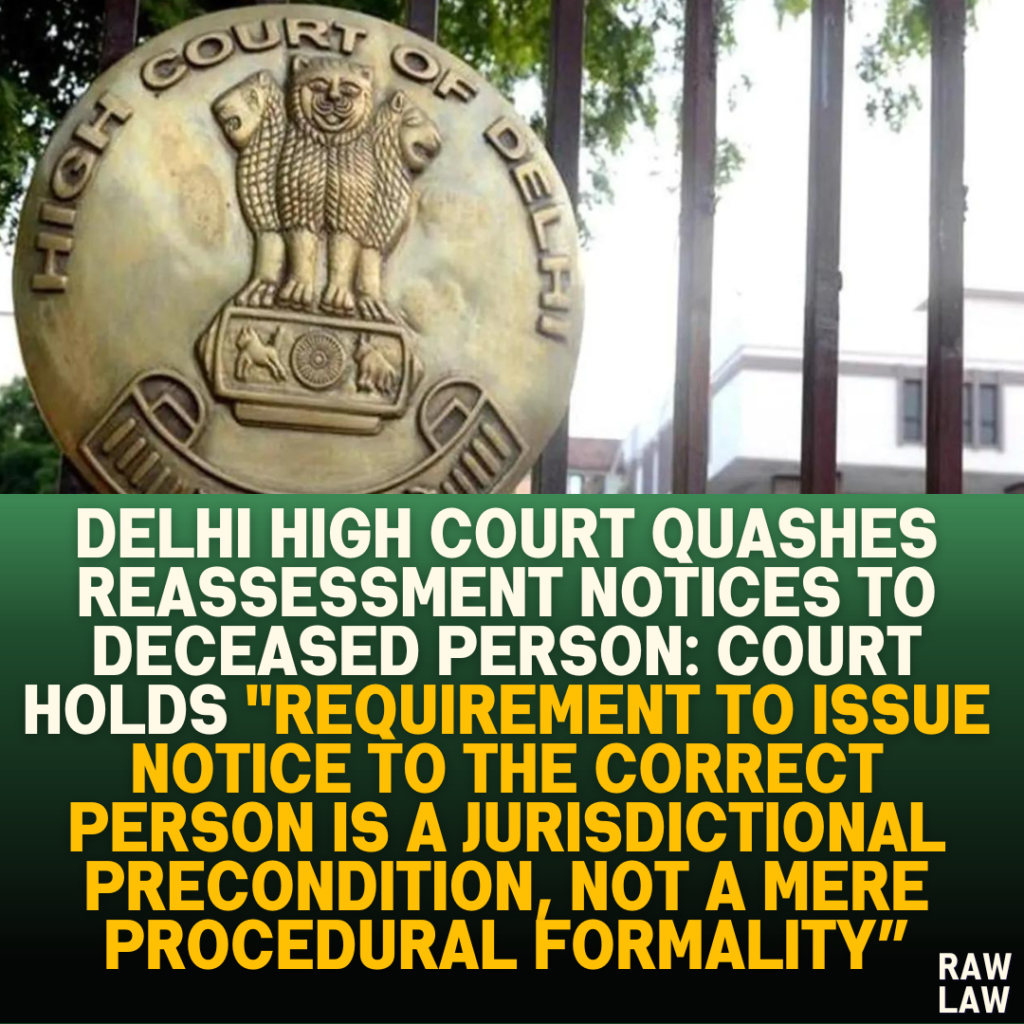Court’s Decision:
The Delhi High Court quashed the reassessment notices issued to a deceased assessee, ruling that the issuance of such notices violated the fundamental jurisdictional requirement that notices must be addressed to the correct person, not a deceased individual. The Court held that even though the initial notice was issued during the lifetime of the assessee, subsequent proceedings were invalid since they were directed at the deceased, without any correction to include legal heirs. Consequently, the notices under Sections 148A(b) and 148 of the Income Tax Act, 1961, were set aside.
Facts:
The deceased assessee had filed an income tax return for the assessment year (AY) 2015-16. A notice under Section 148 of the Income Tax Act was issued to him on April 8, 2021. However, the assessee passed away on May 10, 2021. The petitioner, the legal heir, informed the Income Tax Department of the death of the assessee and updated the legal heir details on the Income Tax Portal. Despite being informed of the death, the Department continued to issue further notices under Sections 148 and 148A in the name of the deceased assessee, leading to the present writ petition.
Issues:
The primary issue before the court was whether reassessment notices issued to a deceased person are valid under the Income Tax Act, 1961.
Petitioner’s Arguments:
The petitioner contended that the reassessment notices were invalid since they were issued in the name of a dead person, despite the Department having been informed of the death and the legal heirs’ details. Citing legal precedents, the petitioner argued that notices under Section 148 are jurisdictional, and issuing them in the name of a deceased person is not merely a procedural error but a fundamental jurisdictional flaw that renders the notices void ab initio.
Respondent’s Arguments:
The respondent argued that the original notice under Section 148 had been issued while the assessee was still alive, and the reassessment proceedings were later carried out in compliance with the Supreme Court’s decision in Union of India v. Ashish Agarwal. The legal heir had also participated in the proceedings, including filing the income tax return for the deceased, which, according to the Department, implied acceptance of jurisdiction.
Analysis of the Law:
The Court relied on various precedents that establish that notices under Section 148 of the Income Tax Act must be issued to the correct person, and issuing a notice to a deceased person is a fundamental jurisdictional error. The Court referred to Savita Kapila v. Assistant Commissioner of Income Tax and Sumit Balkrishna Gupta v. Assistant Commissioner of Income Tax, which underscored that the requirement to issue notice to the correct person is a jurisdictional precondition and not a mere procedural formality.
Precedent Analysis:
The Court followed its earlier judgment in Savita Kapila v. Assistant Commissioner of Income Tax, wherein it was held that the issuance of a notice to a deceased person is invalid. Additionally, the Court cited Chandresh Jayantibhai Patel v. ITO and Durlabhbhai Kanubhai Rajpara v. ITO, reiterating that a notice under Section 148 of the Act, if issued in the name of a dead person, is null and void unless the legal representatives step into the shoes of the deceased without objection, which had not occurred in this case.
Court’s Reasoning:
The Court emphasized that the requirement to issue notice to the correct person is a condition precedent to acquiring jurisdiction for reassessment under Section 148 of the Income Tax Act. The respondent’s failure to revise the notices to address the legal heirs of the deceased was a fatal jurisdictional flaw. The Court observed that the petitioner’s participation in the proceedings did not amount to waiver or submission to the jurisdiction of the Assessing Officer.
Conclusion:
The Court held that the reassessment notices issued under Sections 148A(b) and 148 of the Income Tax Act in the name of the deceased person were invalid. The reassessment proceedings were quashed, and the writ petition was allowed.
Implications:
The ruling reinforces the legal principle that reassessment proceedings must comply with strict jurisdictional requirements. The decision reiterates that issuing notices to a deceased person, even after being informed of the death, constitutes a jurisdictional error that cannot be rectified post facto. The judgment highlights the responsibility of the Income Tax Department to ensure that proceedings are directed at the correct legal entities, particularly after the death of an assessee.



